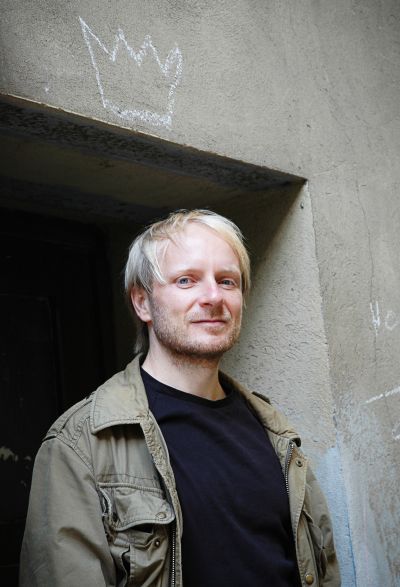
Jochen Schmidt
Jochen Schmidt was born in 1970 in East Berlin. After taking part in numerous language holidays during his studies, he subsequently worked at a university, and translated numerous works into German, such as »Shenzhen« and »Pyongyang« by the Franco-Canadian graphic novelist Guy Delisle. As the industrious co-founder of the weekly stage readings »Chaussee der Enthusiasten« in Berlin, which came to an end in late 2015, his repertoire ranges from short stories, newspaper columns and comic scripts to travel writing and absurd sketches and notes.
»Triumphgemüse« (2000, tr. Triumphant vegetables), Schmidt’s first publication, impresses with its endless series of bizarre characters, parading their brittle dignity. This hyper-realistic examination of numerous episodes from the era following the fall of the Berlin Wall, embedded in a mild melancholia, extracts a laconic power from its characters – as for example in the prize-winning story »Harnusch mäht als wärs ein Tanz« (tr. Harnusch mows as if he’s dancing) – masterfully giving rhythm to every text. That this debut is also an unscrupulous journey through literature, as well as an intimate account of appropriation can be seen for example in the narrator, Jürgen Reip, who incessantly and off-handedly confesses: »Of course I still wasn’t Hemingway. And should I be wrong, then it would be pretty hard for outsiders to tell.« Schmidt’s passionate relationship with language expresses itself in his »apparently endless delight in telling stories« (»Frankfurter Allgemeine Zeitung«), which brought forth his next book, »Müller haut uns raus« (2002, tr. Müller kicks us out), a kind of biographical coming-of-age novel, and subsequently, in 2004, »Gebrauchsanweisung für die Bretagne« (tr. Operating manual for Brittany). On the one hand, he has transformed travel writing into a strictly subjective literary form, in which the reader observes the author observing everything going on around him, and on the other hand he creates a stylized portrait of Brittany as a region characterized by bleak landscapes and wild coastal regions populated by bizarre outsiders in a sort of reverse colonization. »Operating manuals« for Romania (2013) and East Germany (2015) followed. In the novel »Schneckenmühle« (2013; tr. Snail mill), it isn’t only puberty that signals an irreversible change in 14-year-old Jens’ life; in fact in the summer of 1989 the whole of the GDR was more than ready for a major change, which Schmidt describes with great affection, attention to detail and lashings of humor. Press reviews of his most recent work, »Der Wächter von Pankow« (2015; tr. The custodian of Pankow), compared him to Marcel Proust, whose seminal work »In Search of Lost Time« Schmidt studied in great depth, laying bare the many facets of his daily reading regime of Proust in »Schmidt liest Proust« (2008). Repeatedly, his commentary transforms into a text on the subjective conditions of reading, and the transformations triggered by this very text.
The author lives in Berlin.
Triumphgemüse
C. H. Beck
München, 2000
Schmidt liest Proust
Voland & Quist
Dresden/Leipzig, 2008
Schneckenmühle
C. H. Beck
München, 2013
Gebrauchsanweisung für Ostdeutschland
Piper
München, 2015
Der Wächter von Pankow
C. H. Beck
München, 2015
